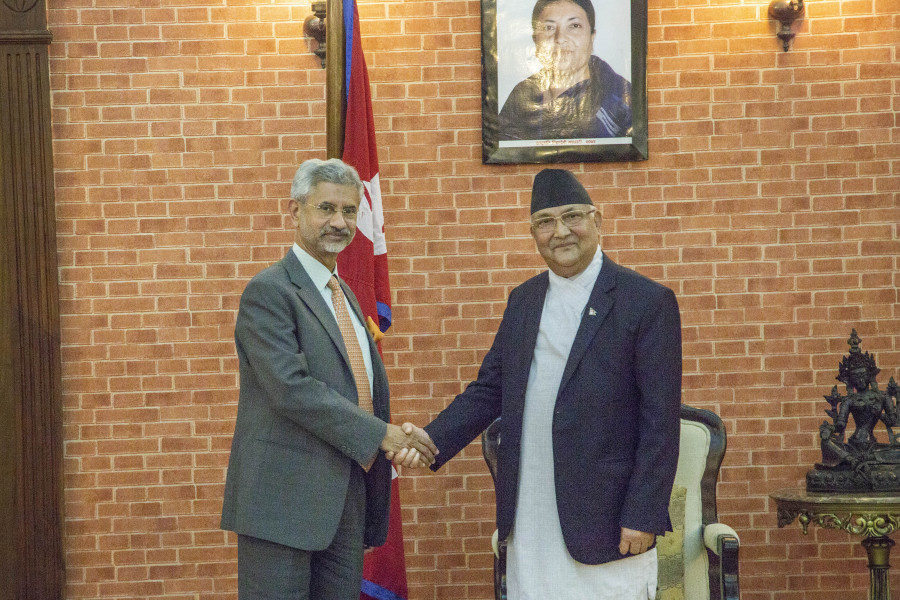Politics
Nepal and India to start a new chapter in bilateral ties
Indian External Affairs Minister conveys Narendra Modi’s readiness to make bilateral ties more dynamic.
Anil Giri
Nepal and India on Wednesday agreed to enter into “a new era of partnership and cooperation” with Narendra Modi’s re-election in India and the formation of a stable government in Nepal.
A Wednesday meeting between Prime Minister KP Sharma Oli and visiting Indian Minister for External Affairs S Jaishankar revolved around increasing bilateral engagements and taking relations between the two countries to new heights, according to leaders familiar with the conversation.
Jaishankar arrived in Kathmandu on Wednesday afternoon, leading an Indian delegation to the fifth meeting of the Nepal-India Joint Commission at the foreign minister level.
Prior to the Joint Commission meeting, Jaishankar paid a courtesy call on Oli to convey Modi’s message of “seeking a new perspective on bilateral ties since both countries had gained political stability”. During the hour-long meeting, Jaishankar told Oli that a positive environment has been created in both countries to take policy decisions, said officials.
After years of wrangling, Nepal adopted a new constitution in 2015 and elections were held in 2017, which elected Oli as the most powerful prime minister in recent history, helping bring about a semblance of political stability in the country.
In India, after his re-election in May this year, Modi appointed Jaishankar as his minister for external affairs. Jaishankar’s is the first high-level visit from India since the Oli government was formed in February last year.
In his message to Oli, Modi has expressed his readiness to make bilateral ties dynamic and progressive, according to Rajan Bhattarai, Oli’s foreign relations advisor.
Nepal-India ties hit a historic low after the promulgation of Nepal’s constitution in September 2015. Just days before Nepal adopted the new statute, Jaishankar, then foreign secretary, had flown into Nepal and held a series of meetings with major political leaders asking that Nepal stop its plans to promulgate the constitution, expressing India’s dissatisfaction with several of the statute’s provisions. Subsequently, New Delhi imposed a border blockade, which created an acute crisis of daily essentials in Nepal.
In response, Oli opposed the blockade and made moves to open up trade and transit ties with China. But last year, then Indian external affairs minister, the late Sushma Swaraj, had met with Oli right before his election as prime minister, signalling that Nepal-India ties were back on track.
Oli on Wednesday told Jaishankar that he has “special relations with Modi” and they have spoken about the development and prosperity of both nations, according to Bhattarai. Jaishankar, for his part, said that India was ready to support Nepal in every endeavour.
“The central message at the political level was that we are entering into a new chapter in bilateral ties,” said Bhattarai.
At the meeting, Oli requested that India receive the long-pending report of the Eminent Persons’ Group on Nepal-India relations. But Jaishankar was noncommittal on the matter, said a participant of the meeting. Members from both sides have been waiting for Modi to formally receive the report, which he hasn’t done so far due to dissatisfaction with some of the report’s recommendations.
Oli and Jaishankar also discussed briefly the situation in Jammu and Kashmir after India’s repeal of the state’s special status. A top security official told the Post that Jaishankar asked for a clearer position on Jammu and Kashmir, rather than what Foreign Minister Pradeep Gyawali told the media during a press conference at the Ministry of Foreign Affairs on Monday.
Although the government has refrained from issuing an official statement on Kashmir, Gyawali, responding to a question during Monday’s press conference at the Foreign Ministry, said, “The Nepal government is in favour of regional peace and stability. The dispute should be resolved through talks and we firmly believe that the government of India has the acumen to resolve the dispute peacefully.”
Jaishnakar went on to inquire after Oli’s health as he will be departing for Singapore for medical treatment on Thursday.
“A warm and in-depth conversation with PM Oli. Really appreciate his receiving me amidst his many preoccupations,” Jaishankar tweeted after the meeting.
After meeting with Oli, Gyawali and Jaishankar led the fifth meeting of the Nepal-India Joint Commission where both sides reviewed all aspects of bilateral ties ranging from political, security and boundary; economic cooperation and infrastructure; trade and transit; power and water resources; culture and education. In the meeting, the two sides apprised each other of the progress made on various bilateral fronts and projects.
After the meeting, a memorandum of understanding was signed between the Food Safety and Standards Authority of India and the Department of Food Technology and Quality Control on developing common food safety and standards.
India handed over a cheque for Rs 1.29 billion (INR 80.71 million), which is part of the government of India’s commitment of INR 5 billion towards strengthening road infrastructure in the Tarai region, and another cheque for Rs 2.45 billion towards reimbursing the government of Nepal for housing reconstruction in Nuwakot and Gorkha districts.
Jaishankar later described the joint committee meeting as “productive”.
“Productive discussions with FM @PradeepgyawaliK at the 5th #IndiaNepal Joint Commission Meeting. Comprehensively reviewed our bilateral relations and identified priority areas for cooperation,” Jaishankar said in a tweet.




 8.54°C Kathmandu
8.54°C Kathmandu














